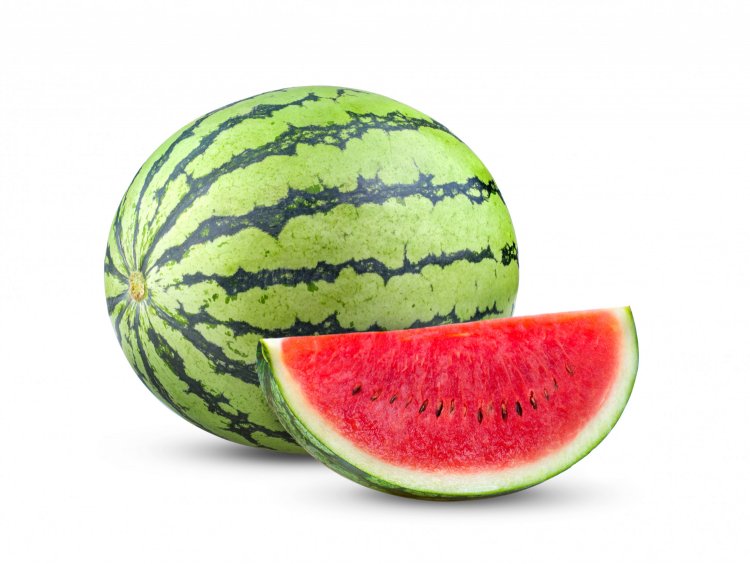Sweet and Nutritious: Unveiling the Surprising Benefits of Watermelon
Watermelon, scientifically known as Citrullus lanatus, is a beloved summer fruit renowned for its juicy sweetness and vibrant color. Originating from Africa, watermelon is now grown in various parts of the world, thriving in warm climates and making its peak appearance during the summer months. Let's delve into the numerous health benefits of watermelon and explore tips for enjoying this delicious fruit to the fullest.

General Information
Watermelon belongs to the Cucurbitaceae family, which also includes cucumbers, pumpkins, and squash. It typically features a thick rind ranging from green to dark green, depending on the variety, and its juicy flesh can vary in color from deep red to pink. While traditional watermelons contain seeds, seedless varieties are also available, catering to different preferences.
Health Benefits
Hydration Powerhouse: With its high water content (over 90%), watermelon is an excellent choice for staying hydrated, particularly during hot weather or after physical activity. Its natural electrolytes, including potassium, help maintain fluid balance in the body, preventing dehydration and supporting optimal cellular function.
Nutrient Density: Despite its high water content, watermelon is rich in essential nutrients. It's a significant source of vitamins A and C, both powerful antioxidants that support immune function, promote healthy skin, and contribute to collagen production. Additionally, watermelon contains substantial amounts of vitamin B6, which plays a role in metabolism and brain health.
Heart Health Support: Watermelon's red flesh owes its color to lycopene, a potent antioxidant linked to various health benefits, particularly in promoting heart health. Lycopene has been associated with reduced risk factors for cardiovascular disease, including lower cholesterol levels and improved blood vessel function.
Anti-inflammatory Properties: Watermelon contains compounds like cucurbitacin E and citrulline, which have demonstrated anti-inflammatory effects in studies. Chronic inflammation is linked to numerous health conditions, including heart disease, arthritis, and certain cancers. Incorporating anti-inflammatory foods like watermelon into your diet may help mitigate inflammation and reduce the risk of related diseases.
Weight Management Aid: Despite its sweetness, watermelon is relatively low in calories, making it a satisfying yet guilt-free snack option. Its high water and fiber content promote feelings of fullness, which can aid in weight management by reducing overall calorie intake and preventing overeating.
Exercise Performance Enhancement: Watermelon's natural sugars provide a quick source of energy, while its electrolyte content helps replenish minerals lost through sweat during exercise. Enjoying watermelon before or after a workout can help maintain hydration levels, enhance endurance, and facilitate post-exercise recovery.
Consumption Tips
Selecting the Perfect Watermelon: Look for a watermelon that feels heavy for its size, indicating juiciness. The rind should be firm and free of bruises or soft spots. A creamy yellow spot on the underside indicates ripeness.
Storing: Whole watermelons can be stored at room temperature for up to a week. Once cut, wrap any unused portions tightly in plastic wrap or store them in an airtight container in the refrigerator for 3-4 days.
Preparation: To enjoy watermelon, wash the outer surface thoroughly under cold running water to remove any dirt or bacteria. Cut the watermelon into wedges or cubes, removing the rind and seeds if desired. Alternatively, blend watermelon chunks into smoothies or juice for a refreshing beverage.
Creative Culinary Uses: Experiment with watermelon in various recipes, such as salads, salsas, and desserts. Combine it with feta cheese, mint, and balsamic vinegar for a flavorful salad, or blend it with lime juice and mint for a refreshing agua fresca.
Safety Precautions: Use a clean knife and cutting board to slice watermelon to prevent cross-contamination. Wash your hands thoroughly before handling watermelon, especially if you're serving it to others.
Conclusion
In conclusion, watermelon is not only a delicious summer indulgence but also a nutritional powerhouse packed with health-promoting nutrients and antioxidants. Whether enjoyed fresh, blended into beverages, or incorporated into savory dishes, watermelon offers a multitude of benefits for hydration, heart health, inflammation, weight management, and exercise performance. By incorporating this versatile fruit into your diet, you can savor its sweet taste while reaping its numerous health rewards.
#Watermelon #Nutrition #HealthBenefits #Hydration #HeartHealth #AntiInflammatory #WeightManagement #ExercisePerformance #HealthyEating #FruitNutrition #FoodTips
Disclaimer:
The information provided in this article is for educational purposes only and should not be considered medical advice. If you have any health concerns or are experiencing symptoms, it is important to consult with a healthcare professional, such as a doctor or clinic, for proper diagnosis and treatment. Always seek the advice of your doctor or other qualified health provider with any questions you may have regarding a medical condition. Do not disregard professional medical advice or delay in seeking it because of something you have read in this article.
What's Your Reaction?





















